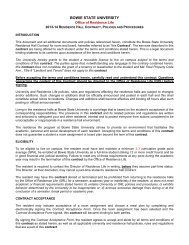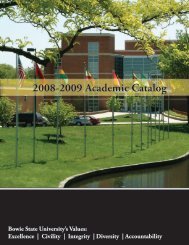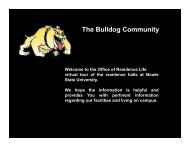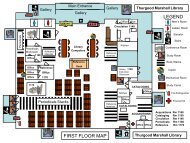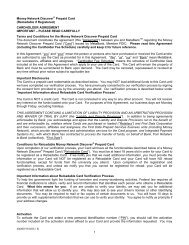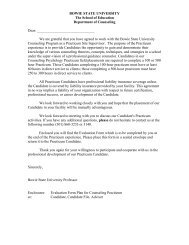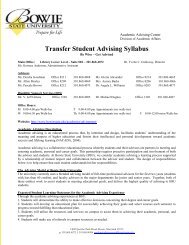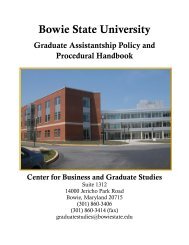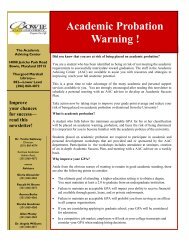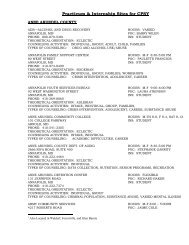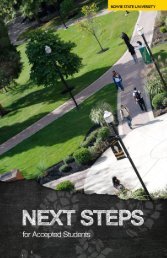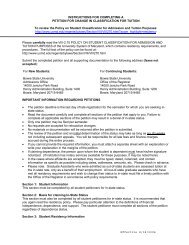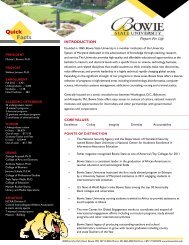2009-2010 - Bowie State University
2009-2010 - Bowie State University
2009-2010 - Bowie State University
You also want an ePaper? Increase the reach of your titles
YUMPU automatically turns print PDFs into web optimized ePapers that Google loves.
ECON 212 PRIN OF MICROECONOMICS (Fall, Spring, Summer, Mini‐Semester) 3 CREDITS<br />
Prerequisite(s): MATH 116, 118, 125 or higher or Permission of Department.<br />
This course is a study of microeconomics, explaining how the price of a product or a resource is determined under various market structures,<br />
how an economy's resources are allocated, and how factor incomes are determined. Current problems in domestic and international economics<br />
are explored. (NOTE: May be taken for honors credit.)<br />
ECON 311 INTERMEDIATE MACROECONOMICS (Fall) 3 CREDITS<br />
Prerequisite(s): ECON 211 and ECON 212. This course is an extension of macroeconomic and microeconomic theories to serve as a bond<br />
between the principles ( level) and the advanced level courses. Macro and micro dimensions of economics will be taught during the first and<br />
second semesters, respectively.<br />
ECON 312 INTERMEDIATE MICROECONOMICS (Spring) 3 CREDITS<br />
Prerequisite(s): ECON 211 and ECON 212. This course is an extension of macroeconomic and microeconomic theories to serve as a bond<br />
between the principles (elementary level) and the advanced level courses. Macro and micro dimensions of economics will be taught during the<br />
first and second semesters, respectively.<br />
ECON‐313 ECONOMICS OF SPORTS AND ENTERTAINMENT (Fall) 3 Credits<br />
Prerequisite: ECON‐211, ECON 212 or instructor’s permission.<br />
Using the tools of microeconomics, this course is divided up into the economic analysis of sports and entertainment. They will begin with<br />
examining both professional and collegiate sports issues such as monopoly and monophony market structures, labor market issues including<br />
free agency and salary caps, and public policy issues related to stadium financing. The second part examines issues in the entertainment<br />
industry. This includes a discussion of the economics of various forms of media including movies, cable, and music. Finally, economic issues of<br />
casinos and amusement parks will be examined.<br />
ECON 321 MONEY, BANKING AND FINANCIAL MARKETS (Fall, Spring, Summer) 3 CREDITS<br />
Prerequisite(s): ECON 211. This course is a study of the nature and function of money and credit, with emphasis on the roles played by<br />
depository institutions and of the structure of the financial market and the effects of regulatory agencies on the financial market and the<br />
money supply.<br />
ECON‐331 BUSINESS AND ECONOMICS APPLICATION OF MATHEMATICS (Spring) 3 credits<br />
Prerequisite: ECON‐211, ECON 212 or instructor’s permission.<br />
This course is designed to introduce students to elementary calculus concepts that are directly related to business and economic theory and<br />
application. The goal is for students to learn calculus specifically to solve problems in business, management and the economic sciences.<br />
ECON‐331 is specially designed for business majors and is not open to students majoring in Computer Science, CTECT, Biology, Mathematics or<br />
any Engineering programs. The course presents concepts and skills on limits and continuity; differential and integral calculus with applications<br />
from business, economics, and the social.<br />
ECON 341 INTERNATIONAL TRADE AND FINANCE (Fall Only) 3 CREDITS<br />
Prerequisite(s): ECON 211 and ECON 212 or Permission of Department. This course focuses on the theory of international trade, commercial<br />
policy and its relation to economic development. Balance of payments, international capital movements, and foreign exchange are examined<br />
against the background of current theories and policies.<br />
ECON‐343 ECONOMICS OF EDUCATION (Fall Only) 3 credits<br />
Prerequisite: ECON 211 and/or ECON 212.<br />
This course is designed to tackle the complex issues of the economics of education. The average student, in college, devotes a significant<br />
amount of time in preparing themselves for ‘a better life’. By the time student graduates from college, they would have spent at least 16 years<br />
in school. The question then becomes, what is education for Following that question is did <strong>Bowie</strong> <strong>State</strong> <strong>University</strong> increase earning potential<br />
These are the fundamental questions this course seeks to address. After covering the basic issues, this course then explores the meaning and<br />
empirics of educational equity; the black‐white achievement gap; the importance and dangers of early education; and the role of the<br />
government in providing education.<br />
ECON 351 BUS/ECON STAT I (Fall, Spring, Summer) 3 CREDITS<br />
Prerequisite(s): MATH 125 and Junior Standing. This course focuses on the business and economics applications of descriptive and inferential<br />
statistics, including measures of central tendencies, dispersion, probability, regression and correlation analysis, hypothesis testing and<br />
parameter estimation.<br />
ECON‐353 HEALTH ECONOMICS (Spring) 3 credits<br />
Prerequisites: ECON 211 and ECON 312.<br />
This course explores economic principles and its relationship to the field of health care. It will provide an introduction to the health care system<br />
in the U.S. We will discuss some of the key concepts that health economists use to analyze health care markets. Finally, we will apply these<br />
concepts to selected current issues in health policy.<br />
ECON 363 ECONOMICS OF DEVELOPING COUNTRIES (Fall Only) 3 CREDITS<br />
Prerequisite(s): ECON 211 and ECON 212 or Permission of Department. This course is an inquiry into the nature, the causes, and the implications<br />
of the process of economic development that focuses on raising the economic well‐being<br />
of nations.<br />
352 <strong>2009</strong>‐<strong>2010</strong> Undergraduate Catalog




